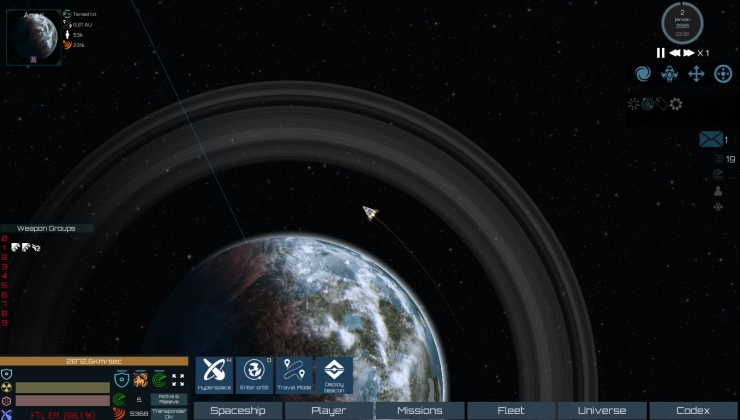As expected really, Valve said they don't really expect to see a true next-gen Steam Deck for a few years yet. Speaking to Rock Paper Shotgun, it's clear Valve are very happy with the first year of the Steam Deck.
Talking to Valve's Lawrence Yang and engineer Pierre-Loup Griffais, it seems it has been blowing their minds. Something of a surprise though, even to me, is that Yang mentioned how they've noticed that "of the people who've purchased a Steam Deck, 42% of them end up spending the majority of their Steam gaming time on Steam Deck – preferring it over their other devices".
So not only is it still selling like tasty sugar-coated hot doughnuts, with it being in the top 10 of global sellers (based on revenue from SteamDB) where it's up against games shifting multiple millions, plenty of people are sticking with it and even shifting over to it.
One sticking point is more games coming out that don't perform well, and while the Steam Deck is impressive, it all depends on developers actually optimising for the hardware, as Griffais said "it'll depend on how developers approach it" and that "If high-end current-gen titles are able to scale to Deck and be a great experience, it also enables smoother performance on a wider variety of PCs, and improve the experience for the whole playerbase". Yang also mentioned how they've "seen a number of recently released demanding titles perform well on Steam Deck, due to developers targeting and testing on the device.".
As always, the problem is in numbers. If the Steam Deck continues selling well, developers won't be able to ignore it. I've seen many games perform brilliantly, even surprisingly so, when they've clearly had a lot of optimization done on them. Then I've also seen the opposite myself, with games that you would think would also work well simply don't (often these bigger AAA games that primarily seem to target consoles…).
When it comes to a true Steam Deck 2, we're clearly in for a wait, as Yang said "a true next-gen Deck with a significant bump in horsepower wouldn’t be for a few years".
Valve don't exactly need much to make the Steam Deck 2 a success — or do they?
Need some more games for Steam Deck? Check out the new Humble Heroines Bundle overview.
Considering how modular Steam Deck is, I wouldn't worry too much about next gen. Yes, there will be games that will be just terrible on SD. You can't win them all. I will take sleek, well running, well configured out of the box set of 2 - 5 thousand games over next big title every day. They are important, but not that important.
Added: also it is worth noting that such high end niche could be filled by other vendor stepping in.
Last edited by Pecisk on 10 Mar 2023 at 1:06 pm UTC
By having a 'target' device in PC, it seems we could benefit from better optimization overall, and that's very good for the average gamer (and the planet), so I'm happy Valve waiting 'years' to see a true next gen, companies seeing the potential of the current one, etc.
Now, 'not true next-gen' well means that in a few months they could release a Deck with better battery life, with OLED, or SSD.
Last edited by Arehandoro on 10 Mar 2023 at 1:13 pm UTC
Now, 'not true next-gen' well means that in a few months they could release a Deck with better battery life, with OLED, or SSD.I was thinking the same when I noticed the clever use of the word ‘true’ in the response. Or maybe it could be that the respondent just carefully left a door open, so no-one can complain should Valve decide to release an updated version.
There is one thing I love about the Steam Deck, for every improvement that's made for games, it translates directly to desktop linux too.
So, whether you're using a deck or not, you're still benefiting from the proton/wine, mesa, vk3d and so on improvements!
Also, without high school, people known nothing about Linux and even after high school (University) they though Linux is a console, because teacher told that (my case) and forbid to ran X, because Linux is good on server and on server there is no need to run KDE/GNOME. IT education program are prepared to teach people about Windows, without knowledge about MS rivals, and with small knowledge as possible. In this case, people create cult of IT, because they do not have knowledge. Windows do not work? Login again! Still do not work? Shutdown computer and launch again! Still? Reinstall Windows, with lost of all data. This is way people after some degree of IT education do for each problem with computer. This is based on dogmas, because they have no knowledge and did not search where problem is to remove it, so it is kind of cult. People without IT knowledge adopt this solutions. And these people, without IT knowledge, try to create some explanation of IT facts around them. They use what they thinking about world from different part of knowledge, like economy. Why Linux is less popular? Because it is worst! And, if they read this explanation, they believe it.
What I am trying to address. Google got Linux (kernel) and shown it is good, but people before Android told Linux is very weak/bad kernel. People stop telling Linux kernel is bad. But is Linux kernel changed? No! Of course, they progress and becomes better and better, but this is still the same piece of code, in most part. Now Steam Deck could get most gaming market, so people will saw KDE is good, Arch is good and Linux is good for gaming. As a result, some people will stop laying that KDE, Linux is bad, especially for gaming.
I think that bad IT education level is designed especially to force people to use Windows/Excel/Word/PowerPoint, because they are scaring of computers (they do not known much about IT, so they have problems and scaring), so they do not perform any changes, especially OS. Also, many security specialist are told, people should not install additional software to computers, because they could contains malware (which is partially right), so people would not install Linux. To avoid expressing they do not have knowledge about computers (they fault), they will attack any unknown person, who try help they.
Last edited by Lachu on 10 Mar 2023 at 1:57 pm UTC
Hopefully they won't do a mid-lifecycle refresh with an OLED screen before I can get a Steam Deck for myself, though - those things hurt my eyes, and I also don't want to waste money on a display that's guaranteed to die, since that goes against the ethos of keeping hardware in service for as long as possible by optimising properly for it.
(often these bigger AAA games that primarily seem to target consoles…)PC ports are still sometimes afterthoughts for these types of developers, so this doesn't surprise me too much.
I belong to the 58% who still plays mostly on the desktop, but I am not parting with my Deck. It has become the device for gaming on the sofa or in bed and filled a gap for me there (I don't own a "proper" console and don't want one). I am still surprised how many recent games it can run just fine (including Hogwarts Legacies). Yes, that's probably going to change in the next few years when newer GPU generations become more widespread, but I expect the Deck to run most if not all the games I am playing for years to come.Oof consoles. I'm glad I got away from them!
I do agree though, Steam deck is great for portable gaming or playing in otherwise off-limits locations! It should run games for many years as you say (assuming you don't get hardware failure) simply because PC games allow adjusting graphics settings and such, so anything that doesn't quite run can probably be tweaked to run at some point (with less visual quality).
The biggest plus over consoles though? All games you're playing on it now, should Deck 2 or even Deck 3 become a thing, you can still use them without needing to buy them again for the current "generation". This for me has always been a major plus of PC gaming over consoles.
That is something a full blown and specced desktop monster for a couple hundreds and thousands will do for you.
It is absolutely fine for a few years to come while the technology advances and we get things like
https://www.youtube.com/watch?v=YGxTnGEAx3E going
Oof consoles. I'm glad I got away from them!Same here. I also feel that part of that is because consoles got away from their strengths, though - seems funny that the Steam Deck, literally a PC, is the hardware that's making an effort to leverage that!
A viable platform doesn't just run games, it has to stabilize so people can build on it. If the deck is a moving target, nobody is going to want to chase it.
Well... if they were to release a "next gen" Steam Deck too soon, it would ruin the credibility of the platform.Technically speaking, PC gaming as a whole is always a moving target. With new hardware that brings (sometimes) big improvements almost yearly, PC game developers are very much accustomed to following a moving target.
A viable platform doesn't just run games, it has to stabilize so people can build on it. If the deck is a moving target, nobody is going to want to chase it.
Technically speaking, PC gaming as a whole is always a moving target. With new hardware that brings (sometimes) big improvements almost yearly, PC game developers are very much accustomed to following a moving target.
Realistically speaking, in terms of people's expectations, this is not a PC. Nobody is going to buy this if they have to keep chasing physical upgrades every year. Game devs will put zero effort (less than they do now) into supporting it, if it's a moving target too.
Well... if they were to release a "next gen" Steam Deck too soon, it would ruin the credibility of the platform.Right now, with Valve seemingly not rushing things, the Steam Deck, to me, feels like an investment. I expect to get years of entertainment out of this thing.
What I’m saying is this: Valve signaling long term support for the Steam Deck, instills confidence for the product in its users.
Maybe there is a better word than ‘confidence’… 🤔
Last edited by benstor214 on 10 Mar 2023 at 5:47 pm UTC
The thing is, they don't have to target the hardware. They only need to ensure it works in proton or SteamOS (which, most of the work has already been done for them).Technically speaking, PC gaming as a whole is always a moving target. With new hardware that brings (sometimes) big improvements almost yearly, PC game developers are very much accustomed to following a moving target.
Realistically speaking, in terms of people's expectations, this is not a PC. Nobody is going to buy this if they have to keep chasing physical upgrades every year. Game devs will put zero effort (less than they do now) into supporting it, if it's a moving target too.
Even if the hardware changes, it doesn't break or change any of the developers previous or current on-going work.
Oof consoles. I'm glad I got away from them!Out of curiosity, what is the problem of consoles for you?
I have a few reasons.Oof consoles. I'm glad I got away from them!Out of curiosity, what is the problem of consoles for you?
Sony royally screwed me over. I owned the original 60GB PS3 back in the day, launch day version.
First, they removed OtherOS support (Linux support) which I had been using. Second, the console died just out of warranty with YLOD (it was a big thing at the time). They wanted me to pay almost the price of a new console to fix it, I didn't so it just sits dead now in the cupboard.
They also got hacked due to not keeping their systems up to date, and lost my personal data and financial data along with many other customers.
I eventually purchased a second PS3, it was a "slim" PS3. This one had removed the ability to play PS1 games from disc, which the older 60GB could do.
That console also eventually had a faulty disc drive and stopped reading games. Again, out of warranty. By this time I had accumulated a lot of PS3 games, so I bought the final model they had released and frankly it was like cheap crap, sliding top for the disc entry and so on. That also failed outside of warranty.
I swore never to buy another Sony console after that lot.
Aside from Sony, you've got console lock-in. If a new console is released, say PS3 to PS4, you can't take your games with you unless you have a working older version of the console, and so if you don't keep the older console or if it fails, your old games are nearly useless. To add insult to injury, they at one point started selling those older games in their digital store. You know, after they stopped new consoles from being able to read the discs.
And finally, vendor lock in, if you choose to use their digital services to buy games, you're permanently tied into their ecosystem. There's no way out of it, you can't just switch stores or play those games without their console.
Overall.. my last years with consoles weren't good to be fair. That's why I basically stopped buying and using consoles by the time the PS4 hit and haven't had any newer consoles since. (Except the deck, count yourselves lucky valve!)
(PS: Yes I'm aware of emulators to play older console games, but I'm talking strictly about the consoles themselves in this instance)
and so if you don't keep the older console or if it fails, your old games are nearly useless.[Relevant recent news-article about the Nintendo Wii U's suicide-NAND](https://nintendosoup.com/wii-u-owners-report-that-their-consoles-no-longer-work-after-years-without-play/).
(PS: Yes I'm aware of emulators to play older console games, but I'm talking strictly about the consoles themselves in this instance)Emulationville is a big landmark in Linuxtown.
Sony royally screwed me overUhh, we have a PS3 (3xxx model, slim) and 2 Dualshock 3's, neither has failed yet but I heard horror stories from others. The PS3 is around 10 years old but used lightly. I also set up RPCS3 and that single PS1 game bought from PSN so I can keep playing on PC in the future.










 How to set, change and reset your SteamOS / Steam Deck desktop sudo password
How to set, change and reset your SteamOS / Steam Deck desktop sudo password How to set up Decky Loader on Steam Deck / SteamOS for easy plugins
How to set up Decky Loader on Steam Deck / SteamOS for easy plugins
See more from me